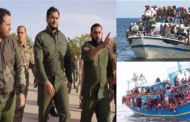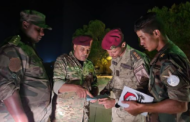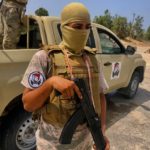Sep. 9, UNSMIL head Jan Kubis announces UN to send first group of ceasefire monitors to Libya.
Sep. 7, security services arrest notorious human trafficker nicknamed Al-Sherir in Zliten.
Sep. 12, authorities confirm late Col. Muammar Gaddafi’s son Saadi released from prison, reportedly flies to Istanbul.
AL-AJAYLAT
- Sep. 12, the Libyan Public Prosecutor, Al-Sadiq al-Sour, announced the arrest of a person, nicknamed “Hajj Hakim” involved in the kidnapping and torture of Egyptian workers in Ajaylat city. In a statement, the Public Prosecutor’s Office explained that the arrested man confessed to kidnapping Egyptian workers, torturing them, and sending their pictures to their families for ransom. It added that the investigations proved the suspect’s involvement in other criminal practices linked to human trafficking across several countries;
ZLITEN
- Sep. 7, security services in western Libya managed to arrest one of the country’s most notorious human traffickers in the port city of Zliten. In a statement, the Libyan Interior Ministry said that the security services arrested the human trafficker, nicknamed Al-Sherir ‘the evil man’. It added that the smuggler was caught whilst preparing to transport a group of migrants across on a small rubber boat to Europe. The ministry stated that all migrants, totalling 44 people, were successfully rescued.
NATIONAL SECURITY
- Libyan security forces arrested a notorious Somali human trafficker, Hassan Qidi, who is accused of leading an organized gang working on illegal immigration and human trafficking. The Libyan Public Prosecution accused Qidi of deliberately killing dozens of migrants, trafficking their organs, and sexually assaulting a number of immigrant women. He was also accused of forcibly detaining migrants and subjecting them to cruel treatment to force their families to pay a ransom for their release. Libyan Attorney General, Al-Siddiq Al-Sour, said Libya would provide help to the kidnapped women and hear the testimony of the victims.

NATIONAL POLITICAL AND SOCIAL ISSUES
- Sep. 12, notables in southern Libya demanded that the authorities release all political prisoners, including symbols of the Gaddafi regime. They also demanded the speedy release of Abdullah Al-Senussi, Head of the Military Intelligence Service and the Yemeni hand of Moammar Gaddafi. Their demands also included their complete rejection of the continued detention of regime figures such as Major General Abdullah Mansour, Major General Mansour Daou and Ahmed Ibrahim. The statement added that the detention of these and other people of the South is a continuation of the policy of “marginalization and exclusion.”;

- The Coordinator of the Fezzan movement, Al-Salik Nino, said that the El Sharara oil field continues its production efforts and a sit-in was held near the field to prevent halt of production. In an interview with Fawasel Media Nino said that residents of the southern region are demanding spatial development and the employment of their youth in the oil facilities in the South. “Our first demand is the dismissal of the Chairman of the National Oil Corporation (NOC), Mustafa Sanalla and the reformation of NOC’s Board of Directors,” he said. Nino, from the Fezzan Movement also said “We demand that the new Board of Directors should include two persons from the South and the appointment of an Undersecretary for the Ministry of Oil from the South and East,” he added.
- The Libyan Parliament has determined the roles and responsibilities of the upcoming president, as the upcoming December elections approach. The Parliament sent a copy of the draft to the head of the UN mission, Jan Kubis. The powers and prerogatives of the President were set in eleven articles. The president’s competencies included selecting the Prime Minister, and assigning him to form a government, as well as being able to dismiss the PM. He is also given the power to choose a Vice President, provided that the Vice President and Prime Minister are from different regions than the President;
- Sep. 6, the National Commission for Human Rights in Libya (NCHRL) praised the release of a number of political prisoners by the Presidential Council, stressing that the decision would help support comprehensive national reconciliation efforts. In a statement, the committee described this initiative as an important step that promotes the establishment of the principles of justice, the rule of law, and human rights. As well as contributing to achieving comprehensive national and social reconciliation in Libya, while also praising the efforts of the judicial authorities. The NCHRL also renewed its call for the release of all illegally detained prisoners, including those who have not been charged and those who have already completed their sentences;
- Sep. 6, the Libyan Presidential Council (PC) announced the release of a number of political prisoners who have already ended their jail terms, or who had not been judicially convicted. In a statement, the Presidential Council confirmed the release of late leader Muammar Gaddafi’s right-hand man, and personal Secretary Ahmed Ramadan from prison. It noted that it will continue working to achieve national reconciliation;
- Libyan authorities announced the release of Saadi Gaddafi from prison, a source from within the justice ministry confirmed Sep. 12. He is the third son of former Libyan leader Muammar Gaddafi, who was killed during a 2011 NATO-led uprising. According to the source, Gaddafi’s son promptly boarded a flight to Istanbul upon his release. The source reportedly claimed that Saadi’s release was the outcome of negotiations with top tribal figures, and Prime Minister Abdel-Hamid Dbaiba;

INTERNATIONAL RELATIONS
- Sep. 12, the Embassies of France, Germany, Italy, the United Kingdom, and the United States in Libya, urged all Libyan actors to ensure inclusive, free, and fair parliamentary and presidential elections on 24 December, 2021. In a joint statement, the embassies said that such elections, as determined in the political roadmap of the Libyan Political Dialogue Forum (LPDF) in Tunis, are an essential step in further stabilising and uniting Libya, and their results should be respected by all;
- ON September 12 the Head of the Libyan Presidential Council, Mohamed Al-Mnifi, met with the Ambassador of the United Kingdom (UK), Caroline Hurndall. They discussed ways to develop cooperation between the two countries, according to a statement by the Presidential Council Sep. 12. During the meeting they also discussed ways to support the national reconciliation project in Libya and the continuation of the ceasefire. Hurndall stressed Britain’s continued support of the Presidential Council and the interim Government of National Unity (GNU). He confirmed that his country will support Libya to work on restoring its role in the international community;
- Sep. 12, the Libyan Foreign Ministry said in a statement that Libya’s representative to the Arab League, Saleh Shammakhi no longer represents Libya. They denied that he was assigned the tasks of Head of the Arab League mission in Madrid. The statement indicated that Shammakhi was let go of his position last June, after he had completed the specified period of his mandate. It added that the investigation committee formed by the Ministry concluded that Shammakhi committed “abuses” while heading the Libyan mission to the Arab League;

- Sep. 11, the Tunisian Director General of Military Health, Mustafa Al-Ferjani, confirmed that the Tunisian-Libyan border will remain closed until the drafting of the joint health protocol between the two countries is completed. In press statements, Al-Ferjani said that the Tunisian scientific committee for the fight against COVID-19 is currently working on drafting a health protocol for the reopening the land, sea, and air borders. Al-Ferjani pointed out that the COVID-19 mutant recorded in many European countries has not yet been detected in Tunisia. This requires tightening the control of borders as a preventive measure;
- Sep. 11, Dai Bing, the Chargé d’affaires at the Chinese Permanent Mission to the United Nations (UN), called for peace and stability in Libya and the holding of Libyan elections as scheduled on December 24th. During the UN Security Council briefing on Libya, Dai Bing expressed his country’s hopes that all Libyan parties will fully demonstrate political will, reach consensus on a constitution and electoral laws as soon as possible. He also hoped that the parties would ensure the elections are held as scheduled, to promote a comprehensive and inclusive political transition process;
- Sep. 11, the Arab Parliament Speaker, Adel Abdulrahman Al-Asoomi, affirmed theArab Parliament’s strong support for the Libyan House of Representatives (HoR) at this critical stage to get out of the ongoing crisis in a way that achieves stability for Libya. This came during a meeting with the Speaker of the Arab Parliament, his Deputy, Alaa Abed and members of Parliament, Shatha Al-Naqbi and Ahmed Abu Shehab, in the presence of the Deputy Speaker of the Libyan HoR, Fawzi Al-Nuwairi, and other Members of Parliament. They discussed several issues of common interest including the coordination of positions to face challenges and the contribution to strengthening security and peace in the Arab region;
- Sep. 10, the Head of the United Nations Support Mission in Libya (UNSMIL), Ján Kubiš, presented his periodic briefing to the United Nations (UN) Security Council on the developments in the situation in Libya. Kubiš urged all member states and regional organizations to send observation teams, in coordination with Libyan authorities and institutions. The aim of these teams is to help ensure integrity and credibility of the electoral process;
- Sep. 10, the Libyan Interior Minister, Major General Khaled Mazen, met with British Minister of State for Middle East and North Africa at the Foreign, Commonwealth and Development Office (FCDO), James Cleverly, in London. The Libyan Interior Ministry said that the two sides discussed cooperation in combating illegal immigration, organized crime, and cybercrime. The meeting also discussed facilitating visa procedures for entering the two countries;
- Egyptian Prime Minister, Mostafa Madbouly said that diplomatic ties with Turkey could be restored this year if outstanding issues are overcome. One of these issues concerns the end of foreign meddling in Libya’s internal affairs. During an interview with Bloomberg Sep. 9, Madbouly said that the key issue for Egypt remains Turkey’s involvement in Libya. The Egyptian Prime Minister explained that no other countries should be physically interfering in Libya. He noted that Egypt is working to help Libyans reach their goal of deciding their own future. “We prefer to leave Libyans to decide their future by themselves”;

- Algerian Foreign Minister, Ramtane Lamamra confirmed his support for the departure of all foreign forces from Libya, “not just mercenaries,” before the 24 December elections. Lamamra said that the removal of these forces should not be random, but rather requires the preparation of an organized plan under international auspices. He explained that Algiers has consulted with the permanent members of the Security Council about the danger of the unorganized exit of these forces from Libya, and its impact on neighbouring countries;
- Head of the United Nations Support Mission for Libya (UNSMIL), Jan Kubis stated at the Arab Leagues Foreign Ministers meeting Sep. 9, that the United Nations is preparing to send the first group of ceasefire monitors to Libya. According to a statement by UNSMIL, Kubis said that the Security Council strongly urged all member states, all Libyan parties, and all relevant actors to respect and support the full implementation of the 23 October 2020 ceasefire agreement, including the withdrawal of all mercenaries, and foreign fighters from Libya without delay;

- Sep. 9, Libya’s Minister of Foreign Affairs, Najla Al-Mangoush held talks with her Kuwaiti counterpart, Sheikh Ahmed Nasser Al-Mohamed Al-Sabah, to discuss bilateral ties and the latest development in the region. During the meeting, held on the sidelines of the consultative meeting of the Arab Foreign Ministers that kicked off ahead of the 156th session of the Arab League Council in Cairo, Sheikh Al-Sabah expressed his full support for Libya’s stabilisation and territorial integrity. Al-Mangoush also presented her Kuwaiti counterpart, in his capacity as Chairman of the current session of the Arab League Council, with an overview of the Libya Stability Initiative, as the first purely Libyan initiative launched by the Government of National Unity (GNU);
- Sep. 9, Head of the Libyan Presidential Council (PC), Mohamed Al-Mnifi received the German Foreign Minister, Heiko Mass in Tripoli, where they discussed the latest political developments in the country. The two officials discussed the efforts of the Presidential Council in ensuring the upcoming elections are held on time, and the promotion of the principle of a peaceful transfer of power, the PC said in a statement. On the occasion, Maas also announced the reopening of the German Embassy in Libya;
- Egyptian and Turkish diplomats have begun discussing the withdrawal of Turkish servicemen and foreign mercenaries from Libya, according to Armenia News. The meetings took place on September 7-8, and were led by Egyptian Deputy Foreign Minister, Hamdi Sanad Loza and his Turkish counterpart Sedat Onal, a diplomatic source stated.
- Sep. 8, First Deputy Speaker of the Libyan Parliament, Fawzi Al-Nuwayri, accompanied by the Head of the parliament’s office, Abdullah Al-Masri Al-Fadil met with the President of the Italian Chamber of Deputies, Roberto Fico and his accompanying delegation to discuss ways to strengthen bilateral relations. Al-Nuwayri stressed the efforts to achieve stability in Libya, and Italy’s important role as an economic partner for the North African country. He also emphasised the readiness of the constitutional basis for holding elections, including the law for electing the President and the law for Parliamentary elections;
- The European Union Mission in Libya (EUBAM) announced the arrival of the High Representative of the European Union for Foreign Affairs and Security Policy, Josep Borrell, to Tripoli Sep. 8. Borrell discussed “the progress made in implementing the roadmap, preparations for the elections, the security situation, and the future of EU-Libya partnerships,” according to a statement by the mission. It noted that this visit “comes at a critical time,” and expressed its hope tor fruitful discussions, in order to progress on the road towards a secure and prosperous Libya;
- Sep. 6, Greek Foreign Minister, Nikos Dendias said that Athens hopes that the new government that is expected to be formed in Libya will, “free itself” from the Turkey-Libya memorandum of 2019. During a joint press conference with his Libyan counterpart, Najla Al-Mangoush in Athens, Dendias described the memorandum as “invalid, non-existent, and illegal,” according to Greek City Times;
- Sep. 6, Tunisia’s Minister of Foreign Affairs, Othman Jerandi, discussed with the French Ambassador to Tunisia, Andre Baran, the importance of helping the Libyan parties implement the internationally agreed roadmap. The two sides discussed the political issues facing the region, such as the Libyan political track, which would contribute to restoring stability and peace in the country. During the meeting, a number of issues related to cooperation and the upcoming benefits at the bilateral and multilateral levels were discussed;
- Sep. 6, Greek Foreign Minister, Nikos Dendias received his Libyan counterpart, Najla Al-Mangoush, in Athens to discuss ways to strengthen bilateral relations. During the talks, the Greek FM reiterated the importance of holding free and fair elections in Libya as scheduled, and stressed the need for the immediate withdrawal of all foreign forces from the country. Dendias also expressed his readiness to assist in the stabilization, and reconstruction of Libya.


























